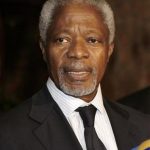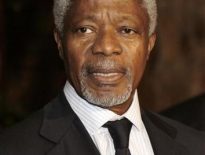By Thomas Escritt
AMSTERDAM (Reuters) – Prosecutors have demanded an 80-year jail term for former Liberian
president Charles Taylor, who last week was convicted of aiding and abetting crimes against humanity, before a sentencing
decision that is expected to set a precedent.

Taylor’s sentencing, on May 30, will be closely watched for its impact on other heads
of state involved in cases at the International Criminal Court (ICC) in The Hague, where Laurent Gbagbo, the former president
of Ivory Coast, is due to face charges of crimes against humanity.
In a brief filed to judges at a special court in
The Hague on Thursday, the prosecution said Taylor’s position as a head of state, and the “length of time during which the
crimes continued”, were aggravating circumstances that necessitated a lengthy term.
Last week judges ruled that
Taylor, 64, had helped the militias which, during the 11-year civil war in Sierra Leone, had perpetrated acts of terror
against the civilian population, disembowelling and mutilating their victims, and recruiting child soldiers.
Until
now, the longest sentence imposed by the Special Court for Sierra Leone (SCSL) was one of 52 years, handed down to Issa
Sesay, a commander in the Revolutionary United Front (RUF) militia that was responsible for some of the war’s worst
brutality.
The prosecution had sought to have Taylor convicted of direct criminal responsibility for human rights
violations committed during the course of the conflict, but judges found that Taylor had not been in a position of direct
command.
“The SCSL has given huge sentences, but that would be difficult for Taylor, given the way judges
characterised his role,” said William Schabas, professor of law at Middlesex University.
FEW PRECEDENTS
For
now, there are few precedents. While Karl Doenitz, the German admiral, was German president in the final days of World War
II, his 10-year sentence was handed down for his activities as a military commander.
Heads of state who have been
tried and sentenced, albeit by national courts, include Alberto Fujimori, who received 25 years for his role in kidnappings
and killings committed while he was president of Peru, and Saddam Hussein, the Iraqi dictator, who was hanged.
“The
whole field (of international criminal justice) is in disarray over sentencing,” said Jens David Ohlin, professor of law at
Cornell University.
“There is quite a debate in our field over whether the central issue is Charles Taylor’s position
as a former head of state or whether it’s more important that he was only an accomplice in these crimes,” Ohlin
added.
“In theory accomplices should receive lower sentences than perpetrators, but if the crimes are so severe that
only a life sentence will capture that level of guilt, then there is an argument that even accomplices should receive a long
sentence.”
The Sierra Leone court has handed down far more severe sentences than the International Criminal Tribunal
for the former Yugoslavia (ICTY), whose sentences have topped out at 30 years apart from one life sentence.
“In
Europe, there is a mindset that excessively long sentences trigger human rights concerns,” Ohlin said.
The ICC, which
has been heavily influenced by the practices evolved over 19 years by the ICTY, was likely to follow this pattern of milder
sentencing, he said.
Judges are due to sentence Taylor at the end of this month, after receiving a sentencing brief
from his defence counsel. Both sides are expected to appeal.





